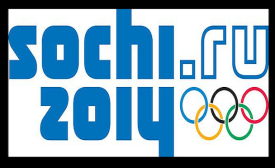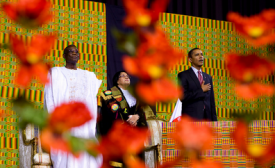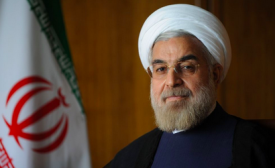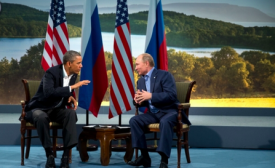obama
As French President Francois Hollande visits the U.S. this week, including being honored at the first state dinner of President Barack Obama's second term, 78% of Americans view France favorably. This represents a full restoration of France's U.S. image more than 10 years after it tumbled to 34% favorable in 2003, when France refused to back the U.S.-led invasion of Iraq.

President Barack Obama
1600 Pennsylvania Avenue NW
Washington, DC 20500
Dear Mr. President:
It is with great respect for you and your office that I write this open letter.
I have covered the Olympic movement for 15 years. The Sochi 2014 Winter Olympics will be my eighth Games.

During the memorial service for former South African president Nelson Mandela, as tens of thousands gathered in the FNB stadium in Johannesburg and millions more watched on television, an entirely different story emerged: the ten-second interaction between U.S. President Barack Obama and Cuban President Raul Castro.

On Sunday, September 22, 2013, al-Shabab, a Somali-based al Qaeda cell unleashed gunfire on a Kenyan shopping mall, murdering 72 people and injuring over 200 others. The deadliest terrorist attack in Kenya since the 1998 bombing of the U.S. Embassy in Nairobi, the Kenyan mall shooting temporarily brought Africa to the forefront of U.S. news organizations like CNN, MSNBC, and Fox, who typically ignore the continent.

It is only in working democracies that an election would mean a real fresh start for the citizens of a country. This seems to be true about Iran. Since the election of the moderate Hassan Rouhani in June 2013, the voters inside the country and statesmen across the world have expected a relatively new Iran.

Russia’s diplomatic intervention in the Syria crisis has received much praise from politicians and media outlets around the world. In a sense, the praise is deserved: by finally pushing the Assad regime into negotiations, Russia has halted – at least for the time being – a universally undesired military action.
China’s President Xi may not have talked about his dream --- what he calls the “China Dream”--- during his first “face-to-face” talks with U.S. President Obama, but some perceptive China watchers and analysts have written about its meaning and implications for all countries of the world.
Western critics tend to focus on the media and cultural components of this push while ignoring the rest. At a time when anxious prognostications about China’s rise dominate media headlines, deriding China’s soft-power strategy -- in particular, its failure to grasp the global appeal of the free press and the free market -- has become a popular act of reassurance for Western academics and media analysts.







